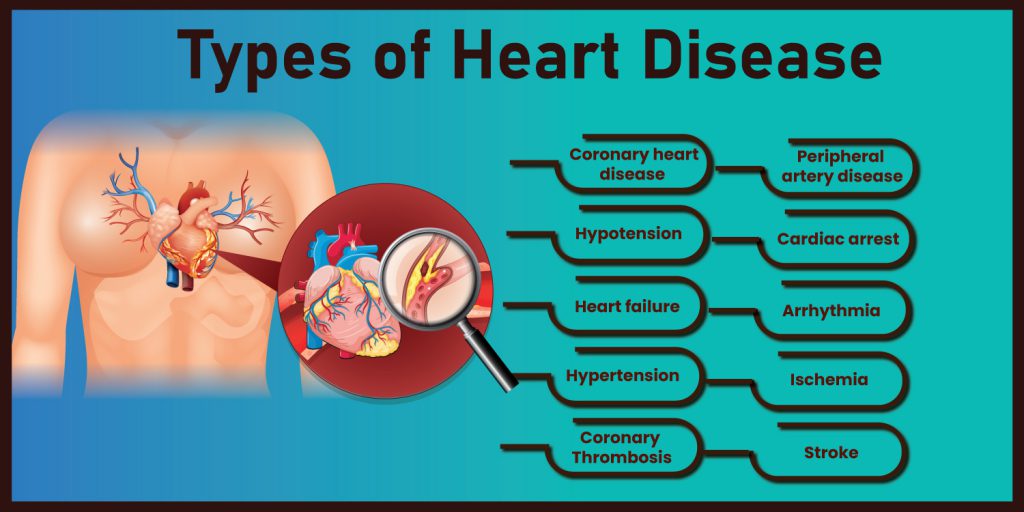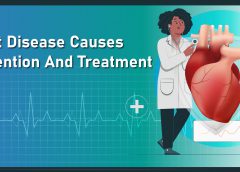The heart is the body’s engine room, operating 24 hours a day, seven days a week, and transporting oxygen and crucial nutrients to every region of the body. Because the heart is our lifeline, it must be protected at all times. Heart disease causes an economic burden and forces adults towards early retirement.
In this blog, we tell you about everything you need to know about heart disease causes, prevention, and treatment. As the saying goes, “With a healthy heart the beat goes onâ€, we hope this blog will help you keep a healthy heartbeat for a healthy life.
How does the Heart work?
To understand heart disease causes and their prevention, we must understand its works. The human heart is divided into four chambers: the right and left atria to accept incoming blood, while the right and left ventricles, which are more muscular, pump blood out of the heart.
It’s a four-chambered pump that accepts unoxygenated blood returned from the body in the right atria. The blood is pumped into the right ventricle, where it is oxygenated and pumped to the left atria for distribution throughout the body.
Causes of heart infection
Bacteria, viruses, and, to a lesser extent, fungi, are the most common causes of infection. Your heart might be damaged or inflamed by a heart infection. The infection mostly damages:
- Heart muscles (myocardium).
- Heart valves
- Inner heart linings.
- Outer hert membrane (pericardium).
What types of heart infections are there?
- Endocarditis: Inflammation of the endocardium ( heart valve lining)
- Myocarditis: Inflammation of the heart muscle.
- Pericarditis: Inflammation around the outer surface of the heart.
Heart Disease: Types and Symptoms
Heart disease is a common term for a range of cardiovascular conditions. Below we have listed the most common types and symptoms of heart diseases include :
Types of Heart Disease:

- Coronary heart disease: Damage to the heart’s major blood arteries. These include:
- Atherosclerosis- The constriction of blood arteries as a result of fat deposition, primarily cholesterol. Arteriosclerosis- The hardening of blood arteries caused by calcium and cholesterol deposits.
- Atherosclerosis- The constriction of blood arteries as a result of fat deposition, primarily cholesterol. Arteriosclerosis- The hardening of blood arteries caused by calcium and cholesterol deposits.
2. Hypertension (high blood pressure): A condition in which the force of blood against the arterial walls is excessive.
3. Hypotension: Low blood pressure.
4. Cardiac arrest: A condition in which the heart stops beating, respiration stops, and the person loses consciousness.
5. Heart failure: A condition in which the heart fails to pump blood as efficiently as it should. It occurs when the heart does not pump the blood effectively. It is sometimes called congestive heart failure due to lung congestion.
6. Arrhythmia: Irregular beating of the heart.
- Bradycardia: Decreased heartbeat rate.
- Tachycardia: Increased heartbeat rate
7. Peripheral artery disease: A cardiovascular disorder in which blood arteries narrow and blood flow to the limbs is reduced.
8. Ischemia: Restricted or reduced blood supply to heart muscles.
9. Angina pectoris: Acute chest pain caused due to insufficient blood supply to the heart muscle.
10. Coronary Thrombosis: It is a form of thrombosis (blood clots) in the right coronary arteries of the heart.
11. Stroke: The result of a disruption in the brain’s blood supply.
12. Congenital heart disease: A heart defect that appears before birth.
13. Blue baby: A condition in which a newborn baby’s skin turns blue. It is primarily caused by deficiencies in the heart, lungs, or blood
Symptoms of Heart Disease
Symptoms are the ways used by the body to communicate health problems. Hence, it is never wise to ignore them. If you face any heart problem symptoms listed below, get expert help right away.
- Consistent chest pain
- Shortness of breath
- Irregular heartbeats
- Dizziness or Lightheadedness
- Feeling exhausted too often
- Excessive sweating
- Discomfort around the shoulders, the back, and the arm.
- Swelling
- Blue-tinged skin
Heart disease: Causes and risk factor
A recent study found that nearly 5 in 10 heart attacks are silent. It is both surprising and worrying that most people are not even aware that they have life-threatening heart disease. Hence, awareness about heart disease causes becomes important for people of all ages, especially keeping in mind modern lifestyle and work pressure.
Coronary artery disease causes
Coronary artery disease (CAD) is the most common heart disease. Cholesterol-containing fat accumulates in arteries, damaging major blood vessels. Atherosclerosis heart disease causes also include unhealthy lifestyle habits such as a poor diet, lack of exercise, being overweight, and smoking.
Arrhythmia of the heart causes
Arrhythmia or irregular heartbeats are unlikely to arise in a healthy individual with a normal, healthy heart. However, in a damaged or diseased heart, electrical signals may not correctly start or flow through the heart, increasing the risk of arrhythmias. A person may be a candidate for Arrhythmia if he/she has:
- Diabetes and other chronic diseases
- Struggles with chronic stress
- History of drug abuse
- Has clogged arteries e (coronary artery disease)
- Has scarring from a previous heart attack.
- Suffers from alcoholism
- Has Caffeine dependency
- Has high Blood pressure
- Smoking
- Has damaged or diseased heart valves
- Is currently on prescription drugs
- Uses nutritional supplements
Causes of congenital heart defects in babies
In the United States, over 40,000 newborn newborns are diagnosed with CHD each year. We can only imagine the figures in less developed economies, where proper healthcare is scarce and only a small percentage of the population has access to it.
CHD symptoms can range from non-existent to life-threatening. Some of the symptoms that may be present include rapid breathing, blue skin, low weight gain, and exhaustion.
CHDs can be passed on through the generations (i.e. they may be inherited). It could also be due to a combination of genetic and non-genetic variables, such as the mother’s diet, health issues, or drug usage during pregnancy.
Causes of cardiomyopathy
Young adults too are at risk of heart-related illnesses. Cardiomyopathy is the most prevalent heart condition among people in their 20’s. Cardiomyopathy is the thickening or enlargement of the heart muscles.
A disorder in which the heart is dilated is known as dilated cardiomyopathy. Cardiomyopathy heart disease causes the heart muscle to stiffen and become less elastic. As a result of the condition, the left ventricle frequently expands.
Dilated cardiomyopathy heart disease causes include:
- Irregular blood flow to the heart
- Infections from toxins, and prescription drugs
- Inheritance i.e. passed down from one’s parents.
- High blood pressure or aging.
Valvular heart disease causes
The valves in the heart may be damaged or diseased for several reasons, including congenital conditions, infections, aging, and conditions linked to other types of heart disease.
Heart Disease: Treatments and Surgery
The treatment plan for heart patients is determined depending on the state of the heart.
Ideally, if heart health is not critical, doctors recommend lifestyle changes and Medications. The medication will be determined by heart disease causes of the patient has.
One can reduce the risk of heart disease with a low-fat, low-sodium diet, participating daily in 30 minutes of moderate activity, stopping smoking, and reducing alcohol consumption.
If lifestyle changes and medications do not work or bring no visible improvement, the doctor may suggest specific procedures or surgery. Again, the procedure or surgery is determined based on the heart disease causes and the extent of the damage.
Heart Disease Prevention
“Prevention is better than cure “
This age-old saying could not have been more apt. There is no secret to a healthy heart. It is simply about making good lifestyle choices. Below we have listed seven open secrets that one can follow for a healthy beating heart:
Healthy Heart Secret 1: Don’t smoke or consume tobacco products
Healthy Heart Secret 2: Follow a heart-healthy diet
Healthy Heart Secret 3: Lower your cholesterol.
Healthy Heart Secret 4: Maintain a healthy weight
Healthy Heart Secret 5: Aim for at least 30 to 60 minutes of activity each day
Healthy Heart Secret 6: Do not take undue stress and sleep well
Healthy Heart Secret 7: When in doubt consult an expert
Healthy habits prevent heart disease causes and keep the heart young forever. Do your part, and care for your heart. If you need expert help and guidance, don’t hesitate or neglect. At Kayawell, we can connect you instantly to heart experts for the best heart disease treatment and health advice. All you need to do is fill out this form!.
Heart Attack FAQs:
How long does a heart attack last?
The acute pain lasts for roughly 15-20 minutes.
What are the symptoms of a heart attack?
Chest pain, discomfort in the shoulder, arm, back, neck, jaw, and teeth; shortness of breath, perspiration, dizziness, and fainting are all warning signs of an impending heart attack.
What to do when someone has a heart attack?
Allow the person to sit on the floor, leaning against a wall or a piece of very heavy furniture that will not slip. This protects the victim from further injury if they collapse. If they lose consciousness and cease breathing, perform CPR. Continue to monitor the pulse, stay calm and call the emergency number for help.

Leave a Reply
You must be logged in to post a comment.